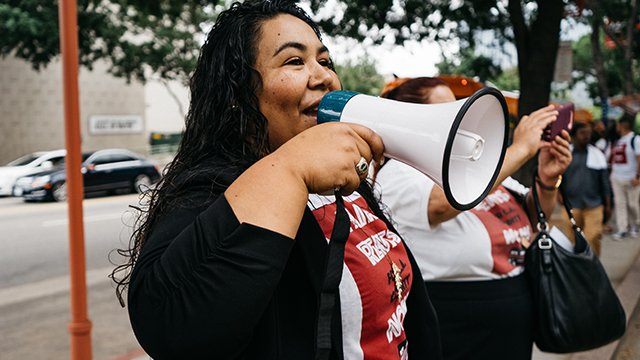Liberty Hill Announces Historic Investment in Grassroots Organizing: Fund for Change & Liberty Vote Grants Announced
Liberty Hill is proud to announce a historic investment in the local grassroots and community organizing ecosystem and its leaders of color in L.A.
The Foundation’s Board of Directors enthusiastically approved an unprecedented 14% endowment withdrawal to expand the scope and impact of the Foundation’s Fund for Change and Liberty Vote! grantmaking programs, which provide general operating support grants for community and electoral organizing in L.A. County.
This investment will enable Liberty Hill to distribute more than $3.34 million in two-year general operating grants to 65 grassroots organizing groups this year—more than tripling the previous Fund for Change disbursement—and expanding the Foundation’s total overall grantmaking portfolio to more than $19 million this year so far.
These grants will support ongoing efforts to advance crucial campaigns, provide direct relief for frontline communities, and support the longevity of partner organizations during the pandemic and beyond.
“Liberty Hill is taking a bold step by committing 14% of our endowment to community organizing, greatly exceeding the national standard of 5%,” said Liberty Hill Board Co-Chair Amelia Williamson. “We did not make this decision lightly. In the midst of a global pandemic that has upended both lives and livelihoods, we know that our greatest asset is the people power we built by investing in the critical work of movement leaders on the ground. We appreciate the generous support of the entire Liberty Hill community of donor activists and foundation partners as we commit these additional funds to fuel grassroots activism and ensure the people closest to the pain are closest to the power.”
This investment is the largest commitment to competitive grantmaking programs in the Foundation’s history. This year’s cohort of grant recipients also represents an incredibly diverse group—including Black, Native-led, and transgender-led organizations spanning a wide area of Los Angeles County—including areas like Pomona, the Antelope Valley, Long Beach and other regions—with a focus on racial justice, youth and transformative justice, economic and housing justice, environmental and climate justice, and LGBTQ and gender justice.
Along with funding a strong group of longstanding community organizations, this expanded strategy also underscores Liberty Hill’s commitment to supporting emerging organizations at various levels of development.
With a unique focus on “Rising Activist'' organizations that have formed within the last 10 years, with annual budgets of less than $500,000, and fewer than three full-time staff members—these partners represent underrepresented communities and geographies with limited existing nonprofit infrastructure. Investments in these groups are particularly critical as low income people of color continue to be displaced from central areas of the County to neighborhoods where fewer institutions exist to advocate for historically oppressed communities. These organizations are creating innovative and powerful strategies for organizing and developing leaders to tackle intractable problems and build communities where everyone can thrive.
While Liberty Hill is prioritizing Rising Activist groups, the Foundation remains committed to funding activism at all stages, including through their Liberty Vote! Electoral Grantmaking program designed to fuel electoral organizing through 501c4 organizations.
“Unprecedented times call for bold choices. In this time of great struggle in Los Angeles and beyond, Liberty Hill’s leaders have intentionally decided to make a historic investment in community organizing,” said Liberty Hill President/CEO Shane Murphy Goldsmith.
We know it works. Frontline community activists are leading the fight toward a just recovery and we are proud to remain fully committed to our mission of building people power and fighting for a future where Justice for All is realized. We encourage our allies in philanthropy to join us in moving money to low income communities of color in these crucial times with as few restrictions as possible.
